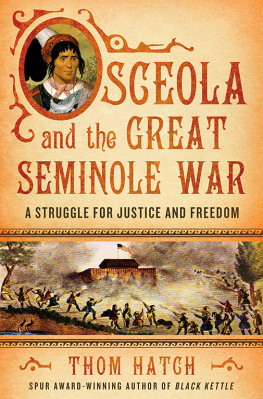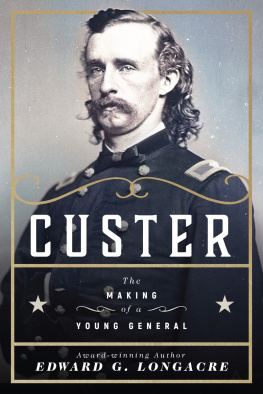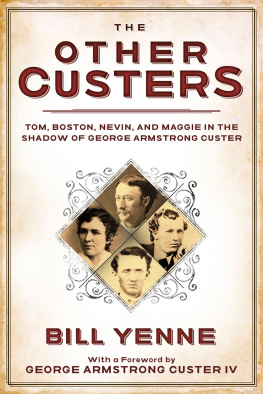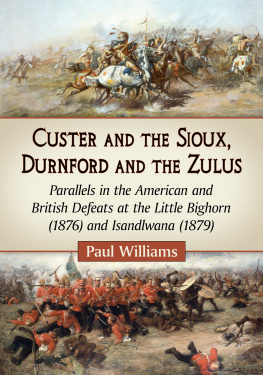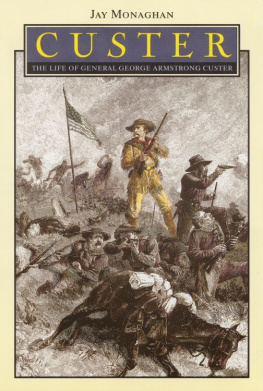Thom Hatch - Glorious War: The Civil War Adventures of George Armstrong Custer
Here you can read online Thom Hatch - Glorious War: The Civil War Adventures of George Armstrong Custer full text of the book (entire story) in english for free. Download pdf and epub, get meaning, cover and reviews about this ebook. year: 2013, publisher: St. Martins Press, genre: Detective and thriller. Description of the work, (preface) as well as reviews are available. Best literature library LitArk.com created for fans of good reading and offers a wide selection of genres:
Romance novel
Science fiction
Adventure
Detective
Science
History
Home and family
Prose
Art
Politics
Computer
Non-fiction
Religion
Business
Children
Humor
Choose a favorite category and find really read worthwhile books. Enjoy immersion in the world of imagination, feel the emotions of the characters or learn something new for yourself, make an fascinating discovery.

- Book:Glorious War: The Civil War Adventures of George Armstrong Custer
- Author:
- Publisher:St. Martins Press
- Genre:
- Year:2013
- Rating:4 / 5
- Favourites:Add to favourites
- Your mark:
- 80
- 1
- 2
- 3
- 4
- 5
Glorious War: The Civil War Adventures of George Armstrong Custer: summary, description and annotation
We offer to read an annotation, description, summary or preface (depends on what the author of the book "Glorious War: The Civil War Adventures of George Armstrong Custer" wrote himself). If you haven't found the necessary information about the book — write in the comments, we will try to find it.
Thom Hatch: author's other books
Who wrote Glorious War: The Civil War Adventures of George Armstrong Custer? Find out the surname, the name of the author of the book and a list of all author's works by series.
Glorious War: The Civil War Adventures of George Armstrong Custer — read online for free the complete book (whole text) full work
Below is the text of the book, divided by pages. System saving the place of the last page read, allows you to conveniently read the book "Glorious War: The Civil War Adventures of George Armstrong Custer" online for free, without having to search again every time where you left off. Put a bookmark, and you can go to the page where you finished reading at any time.
Font size:
Interval:
Bookmark:
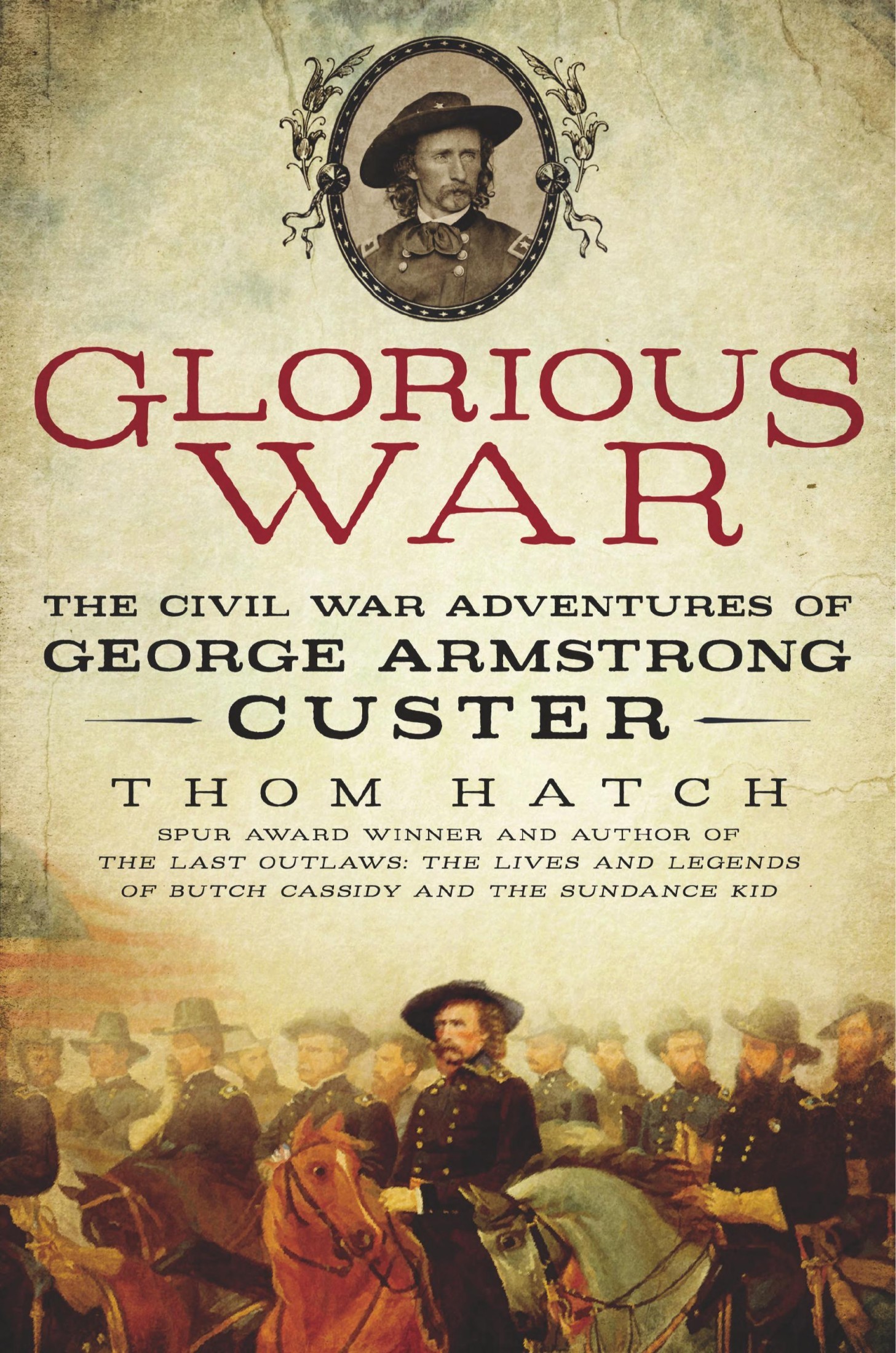

The author and publisher have provided this e-book to you for your personal use only. You may not make this e-book publicly available in any way. Copyright infringement is against the law. If you believe the copy of this e-book you are reading infringes on the authors copyright, please notify the publisher at: us.macmillanusa.com/piracy.
To Lynn and Cimarron,
two very special people
Contents
Maps
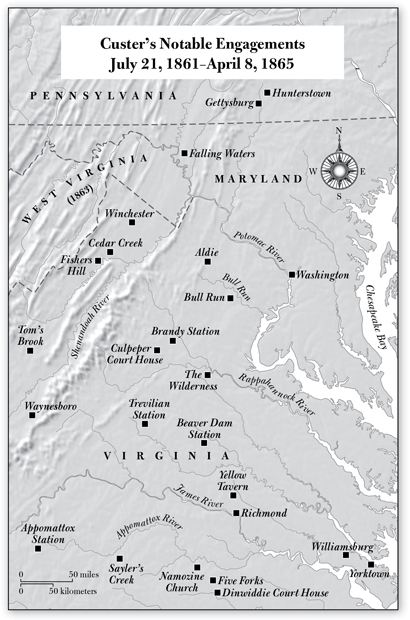
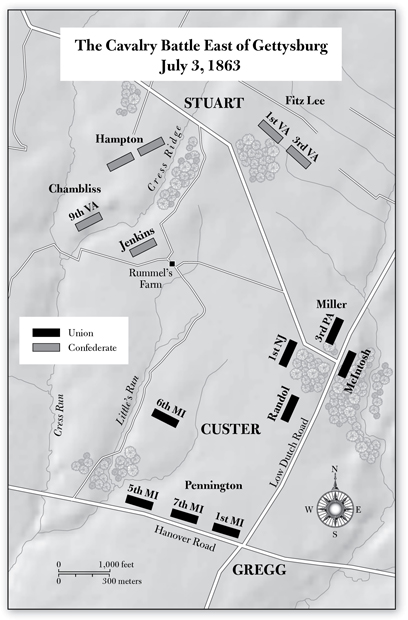
Prologue
On the afternoon of July 3, 1863, Confederate Major General George E. Pickett led over thirteen thousand gray-clad soldiers on a brazensome say suicidalcharge across an open meadow toward the center of the Union line at Cemetery Ridge. It was apparent to both sides that the outcome of the three-day battle for Gettysburg, and possibly the Civil War, would be decided by the success or failure of this audacious maneuver.
The tactic had been brilliantly designed by General Robert E. Lee as a coordinated effort with a detachment of Confederate cavalry that would simultaneously strike the Union rear from another direction and cause havoc along the lines. If this collaborative plan was successful, Pickett and his mile-wide line of men would smash through that blue-clad front to rout the Yankees and place the future of the Army of the Potomac and the Union itself in dire jeopardy.
Three miles east of Gettysburg down the Hanover Road, legendary Confederate cavalry commander Major General James Ewell Brown Jeb Stuart and his six thousand horsemenknown as the Invincibleswere poised to support Pickett by attacking the Union rear. When the cannon barrage was fired from Gettysburg, Stuart would lead his mounted troops down Cress Ridge on a purposeful ride toward the Yankee lines.
Stuart had been a thorn in the side of the North throughout the first two years of the war. As commander of the Army of Northern Virginias elite cavalry, he had redefined the role of horsemen as an independent arm capable of wreaking havoc upon his enemy and had not come close to being challenged by the outclassed Union cavalry. His bold raids into enemy territory had disrupted communication and supply lines, gathered vital intelligence, and destroyed millions of dollars worth of propertyin addition to bloodying his enemy at will. His spectacular 1862 ride around McClellans army had embarrassed the North and instilled confidence in the Souths belief that it could prevail. Stuart had been elevated to a lofty position in the hearts of his Southern admirers that rivaled that of a knight of King Arthurs court and had gained at least grudging respect from his Northern opponents. Now he had been called upon to play a significant role in the pivotal Gettysburg battle.
Blocking Stuarts access to the battlefield in support of Pickett was only one brigade of Union cavalryabout twenty-three hundred men. This brigade of Wolverines from Michigan was commanded on the field by twenty-three-year-old Brigadier General George Armstrong Custer, who had been promoted from brevet captain to his present rank only three days earlier. Custer had never before commanded a large unit in combat, having served mainly as an aide-de-camp on the staffs of several generals.
Although Custer had personally distinguished himself under fire, he was now placed in the precarious predicament of facing the finest cavalrymen and cavalry commander the Confederacy had to offer with only a small detachment of battle-weary, outnumbered troops at his disposal.
History has recorded and analyzed in scrupulous detail virtually every footfall taken by Picketts men across that open field and the resoluteness of the Union soldiers entrenched along the line on that day. The same cannot be said for this engagement three miles east of Gettysburg.
What, if anything, could Custer, the young, inexperienced cavalry officer, devise to stop Stuarts determined troopers from reaching the field and supporting Picketts charge?
With perhaps the destiny of the Union at stake, it was evident to observers that the old cavalry master Stuart was about to teach the upstart Custer a bloody lesson on his way to attacking the Union rear and securing victory for the South.
Or, by some miracle or quirk of fate, could this skirmish become the stuff from which legends are born?
George Armstrong Custer, known for only one day in his lifethe day he died, which has invariably tarnished his entire careerwas on the threshold of becoming a legend.
One
West Point Cadet
In January 1857, a letter addressed to George A. Custer, Esq. arrived in the mail at the Emanuel Custer residence in New Rumley, Ohio. This official-looking correspondence, which had been postmarked from the nations capital, was known to contain potentially life-changing news that the entire family had been anticipating with some anxiety.
Seventeen-year-old Georgeknown to his family as Armstrong or Autietore open the envelope to remove a form letter written on crisp, white stationery and signed by Secretary of War Jefferson Davis. The boy quickly scanned the words, his fair-skinned face flushing and his mischievous blue eyes lighting on fire.
Armstrong handed the letter to his father, who, after absorbing each word, in turn gave it to his wife, Maria, who read the message with a sense of sadness. This was the news that Maria had been dreadingnot so Armstrong.
The letter informed him that he had been awarded an appointment to the United States Military Academy at West Point, New York. There was a good chance that by this time the boy could no longer contain himself and let out a series of joyous whoops. He was a spirited boy who was prone to such displays of enthusiasm.
This coveted appointment, which would take effect in June, had not come without a great measure of surprisingly good fortuneagainst seemingly insurmountable oddsthat has baffled historians to this day.
Young Armstrong had arrived at the conclusion that he would require some sort of assistance in order to further his education at an institution of higher learning. Otherwise, due to the familys meager finances, he might be relegated to make his way in the world on merely a high school education and whatever skills he could muster on his own. There was a good chance that out of necessity he would be compelled to learn a trade, which was not to the liking of a young man with great dreams and high ambitions.
Armstrong had always been an avid reader of adventure novels and envisioned the glory that might be attained by a military career. On a more practical note, he believed that being a graduate of a prestigious school like West Point would open endless doors of opportunity. So he had made up his mind to shoot for the top. To that end, he wrote to his districts Republican representative, John A. Bingham, and requested an appointment to the United States Military Academy at West Point.
This audacious act by the son of an outspoken, lifelong Democrat demonstrates the undaunting determination that would be Custers lifelong hallmark. The odds that a son of Emanuel Custer, whose politics were the polar opposite to those of Bingham, could gain political patronage from a Republican were astronomical. And Armstrong himself did not help his cause in the least when he participated in a rally for Democratic presidential hopeful James Buchanan and later protested an appearance by Republican John C. Fremont.
Font size:
Interval:
Bookmark:
Similar books «Glorious War: The Civil War Adventures of George Armstrong Custer»
Look at similar books to Glorious War: The Civil War Adventures of George Armstrong Custer. We have selected literature similar in name and meaning in the hope of providing readers with more options to find new, interesting, not yet read works.
Discussion, reviews of the book Glorious War: The Civil War Adventures of George Armstrong Custer and just readers' own opinions. Leave your comments, write what you think about the work, its meaning or the main characters. Specify what exactly you liked and what you didn't like, and why you think so.

